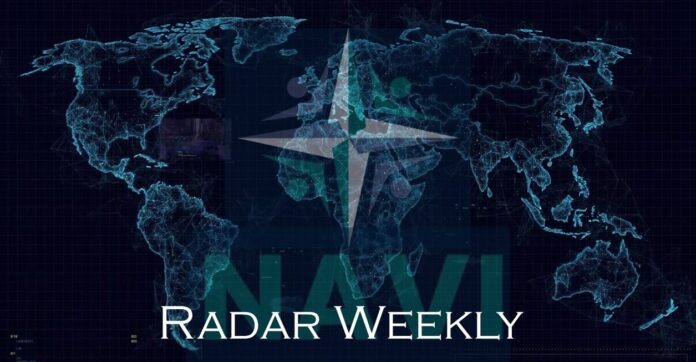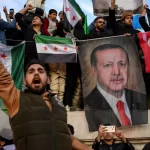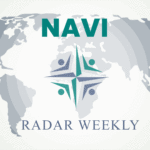Focus Point: Regional Security- NATO
Putin warns the West a Russia-NATO conflict is just one step from World War Three | Reuters
Guy Faulconbridge |18.03.2024

Summary:
- Putin warns West over sending troops to Ukraine.
- Putin says NATO personnel already in Ukraine.
- Russia may take buffer zone out of Ukraine regions.
- Putin says he approved exchange of Navalny before death.
- Putin says the world is laughing at U.S. election. Read more…
Focus Point: Regional Security- European Security
EU’s grand defence industrial plans risks fizzling for lack of money and unclear procedures | IISS
Ester Sabatino | 18.03.2024

The European Union launched an effort to boost its defence industrial base with great fanfare, but a lack of financial firepower and a procedural minefield risk the bloc missing its target of bolstering the EU defence industrial base and becoming less dependent on foreign suppliers.
EU foreign policy chief Josep Borrell, in announcing the first ever European Defence Industrial Strategy (EDIS) on 5 March, said that ‘after decades of under-spending, we must invest more on defence’.
Flanked by other high-level EU representatives, he added that ‘a strong, resilient, and competitive European defence industry is a strategic imperative and a pre-condition to enhance our defence readiness’.
The European Commission, the bloc’s executive arm, has long championed the idea of members spending more, better, together and on European systems. The strategy gives some specificity to that ambition.
By 2030, EU member states should aim to acquire at least 50% of defence equipment in the EU, increasing that share to at least 60% by 2035. In addition, by 2030, at least 40% of procurement should be collaborative.
To translate objectives into deeds, the Commission also proposed a regulation, the European Defence Industry Programme, effectively an operational plan for the new strategy. There is uncertainty over the initiative, though, since the European Council and Parliament still need to agree to the plan. Read more…
Focus Point: Regional Security- NATO
Secretary General in Armenia: stability in the South Caucasus matters to NATO| NATO
nato.int | 19.03.2024

NATO Secretary General Jens Stoltenberg concluded his tour of the South Caucasus on Tuesday (19 March 2024) in Yerevan, Armenia where he met with President Vahagn Khachaturyan and Prime Minister Nikol Pashinyan.
On stability in the South Caucasus, the Secretary General urged Armenia and Azerbaijan to reach an agreement to pave the way for the normalisation of relations and a durable peace. “This matters for Euro-Atlantic security as we face a more dangerous world,” he emphasised, reiterating that “NATO supports Armenian sovereignty and territorial integrity, and your peaceful aspirations.” Read more…
Focus Point: Security and Defense Policy- Russia-Ukraine War
Russian Offensive Campaign Assessment, March 20, 2024 | ISW
ISW | Report | 20.03.2024

Several Russian financial, economic, and military indicators suggest that Russia is preparing for a large-scale conventional conflict with NATO, not imminently but likely on a shorter timeline than what some Western analysts have initially posited.
Polish President Andrzej Duda emphasized in a March 20 interview with CNBC that Putin is intensifying efforts to shift Russia to a war economy with the intention of being able to attack NATO as early as 2026 or 2027, citing unspecified German research.
Danish Defense Minister Troels Lund Poulsen stated on February 9 that new intelligence indicates that Russia may attempt to attack a NATO country within three to five years, an accelerated timeline from NATO’s reported assessment in 2023.
The Russian military continues to undertake structural reforms to simultaneously support the war in Ukraine while expanding Russia’s conventional capabilities in the long term in preparation for a potential future large-scale conflict with NATO.
Shoigu outlined several ongoing efforts to bolster Russia’s conventional military capabilities, more likely as part of Russia’s long-term effort to prepare for a potential conventional war with NATO than as part of the war against Ukraine.
Ongoing personnel changes within the Russian MoD may be further indicators of Russia’s preparations for a conflict in the long term.
The Ukrainian Main Military Intelligence Directorate (GUR) reportedly conducted a drone strike against a Russian air base in Saratov Oblast on March 20 amid further indications that Ukrainian drone strikes within Russia are achieving limited asymmetric effects against Russian military assets and economic output.
Kremlin-affiliated actors in the pro-Russian Moldovan autonomous region of Gagauzia are invoking narratives that mirror previous Russian claims about Ukraine in the years leading up to Russia’s 2022 full-scale invasion of Ukraine, likely as part of the Kremlin’s wider hybrid efforts to destabilize Moldova. Read more…
Focus Point: Security and Defense Policy- Russia-Ukraine War
Russia preparing for wider conflict with NATO sooner than expected, says report | Euronews
Oleksandra Vakulina | 21.03.2024

With US funding for Ukraine still in limbo, European allies are trying to ramp up their support as Russia mounts new strikes.
Russia is preparing for a large-scale conventional conflict with NATO, according to the Institute for the Study of War, based on an analysis of several Russian financial, economic, and military indicators.
The think tank explains that while any such conflict won’t happen imminently, Russia is likely planning on a shorter timeline than some Western analysts have previously posited.
The Russian military is undertaking structural reforms to simultaneously support the war in Ukraine while expanding its conventional capabilities in preparation for a potential future conflict with NATO. Read more…
Focus Point: Regional Security- Middle East
EU leaders call for Gaza cease-fire amid ‘humanitarian tragedy’ | Politico
Paul Dallison, Barbara Moens and Clea Caulcutt | 21.03.2024

After 166 days of Israel’s retaliatory airstrikes and ground operations in Gaza, EU leaders called for a cease-fire, showcasing unanimity on the matter for the first time since October.
The 27 European Union countries have been divided on Israel’s war in Gaza and have failed to show a united front until now. Some countries, such as Germany, have shifted their position on calling for a cease-fire.
In the end, it was the news that the U.S. will propose a resolution at the U.N. Security Council on Friday calling for a cease-fire that appeared to move the dial in Europe at a summit in Brussels.
In part, Belgian Prime Minister Alexander De Croo told reporters, “gradually other countries joined our position and the fact that the US have adopted [this position] too played a part.”
European Council President Charles Michel on Thursday called the situation “a humanitarian tragedy.”
EU leaders have called for “an immediate humanitarian pause leading to a sustainable cease-fire,” Michel said after the summit talks.
Michel added that “full & safe humanitarian access into Gaza is essential to provide the civilian population with life-saving assistance in a catastrophic situation in Gaza.”
A text approved by all 27 leaders also calls for “the unconditional release of all hostages and the provision of humanitarian assistance.”
The statement adds: “The European Council is deeply concerned about the catastrophic humanitarian situation in Gaza and its disproportionate effect on civilians, particularly children, as well as the imminent risk of famine caused by the insufficient entry of aid into Gaza.” Read more…
Focus Point: Regional Security- Middle East
Russia and China veto US proposal for Gaza ceasefire at the UN| Euronews
Euronews with AP |22.03.2024

Russia and China veto US resolution calling for immediate cease-fire in Gaza
Russia and China have vetoed a US-proposed resolution in the UN Security Council that called for a ceasefire in Gaza tied to a hostage agreement.
The vote in the 15-member Security Council was 11 members in favour and three against, including Algeria, the Arab representative on the council. There was one abstention, from Guyana.
Prior to the vote, Vassily Nebenzia, the Russian Ambassador to the U.N., stated that Russia was in favour of an immediate halt to hostilities. However, he criticised diluted language that referred to moral imperatives, which he called philosophical wording that does not belong in a U.N. resolution.
Nebenzia accused U.S. Secretary of State Antony Blinken and U.S. Ambassador Linda Thomas-Greenfield of “deliberately misleading the international community.”
While the resolution would have been officially binding under international law, it would not have ended the fighting or led to the release of hostages. But it would have added to the pressure on Israel as its closest ally falls more in line with global demands for a cease-fire at a time of rising tensions between the U.S. and Israeli governments.
Focus Point: Security and Defense Policy- Russia-Ukraine War
Death toll from Moscow concert attack rises to 133 as more bodies found | The Washington Post
Kelsey Ables, Francesca Ebel, Mary Ilyushina and Robyn Dixon| 23.03.2024

A deadly attack on a Moscow concert venue has killed at least 137 people, the worst terrorist attack to hit Russia in 20 years. Four men have been charged in the assault, which the Islamic State has claimed responsibility for.
Russian President Vladimir Putin told his nation in a televised address Saturday that 11 people have been detained in connection with Friday’s deadly attack on a popular Moscow concert venue, including the four gunmen who opened fire, killing at least 133.
Putin claimed that the assailants had been trying to escape via Ukraine, “where according to preliminary data, a window for them to cross the state border was prepared by the Ukrainian side.” Ukrainian officials have denied any involvement in the attack.
Late Friday (22 March 2024), gunmen armed with automatic weapons attacked the Crocus City Hall — a massive shopping and entertainment venue on the outskirts of Moscow — and set the concert hall on fire. The assault followed U.S. government warnings this month about a “planned terrorist attack” in the Russian capital.
Putin called the attack a planned and organized mass murder of innocent and defenseless people, and he promised swift retaliation.
“The criminals in cold blood, purposefully went to kill and shoot at point-blank range our citizens and our children, as the Nazis did who committed massacres in the occupied territories. They planned to stage a demonstrative execution, a bloody act of intimidation,” he said.
Putin said “All perpetrators, organizers and sponsors of this crime will be fairly and unavoidably punished, whoever they are or whoever directs them.”
Focus Point: Security and Defense Policy- Great Power Competition
In the Conflict Between the West and Authoritarian Foes, Islamic State Sees All Sides as Targets | WSJ
Yaroslav Trofimov and Sune Engel Rasmussen | 23.03.2024
The U.S. and its liberal democratic allies may be facing off with authoritarian powers Russia, Iran and China as wars in Ukraine and Gaza inflame global rivalries. But to Islamic State, they’re all enemies of the Muslim faith that should be annihilated.
Friday’s assault on a concert hall outside Moscow that killed at least 133 people, the worst terrorist attack in Russia in decades, drove home that point. Two months ago, Islamic State claimed responsibility for the deadliest strike in Iran in decades, a bombing in the city of Kerman that killed more than 80 people.
Major Islamic State attacks in the West peaked in 2017, though Islamic State militants claimed lethal stabbings and shootings in Belgium, France and Austria since then.
“Great-power competition is alive and well, but it matters not at all to Islamic State,” said Colin Clarke, director of research at the Soufan Group, a consulting firm that focuses on terrorist threats. “While we see big divisions between Beijing, Moscow and Washington, they look at us all as a target. This is a transnational threat.” Read more…
Focus Point: Security and Defense Policy- Russia-Ukraine War
Russian Missile Passes Over Poland and into NATO Airspace, Military Reports—For A 2nd Time | Forbes
Zachary Folk | 24.03.2024

Key Facts:
- The missile entered Polish airspace at 4:23 a.m. near the town of Oserdów, a small rural village close to the nation’s eastern border with Ukraine.
- The Polish military said in a statement that “Polish and allied aviation was activated.”
- Jacek Goryszewski, the Polish military’s spokesperson, told reporters at a press briefing on Sunday the missile traveled about 1.2 miles above Poland before re-entering Ukraine.
- The breach coincided with an intense early morning attack on Ukrainian infrastructure that saw 57 missiles and drones strike targets in Lviv, Kyiv and other towns in western Ukraine, Reuters reported.
- The Russian government has not released any statement on the incident.
- NATO leaders have not commented on the breach as of Sunday morning, and the alliance did not return a request for comment from Forbes. Read more…
Focus Point: Regional Security- Indo-Pacific
As China prepares to invade Taiwan, US forces are about to combat-test a vital weapon | The Telegraph
David Axe | 24.03.2024

The main mission of the US Army flotilla now sailing toward Gaza is to build a floating pier that will help ships offload desperately-needed humanitarian aid. But the task force also serves a secondary purpose: it’s practice for a critical combat operation – one that could help US forces to roll back Chinese advances in the event of a war over Taiwan.
The Joint Logistics Over-the-Shore pier system, or JLOTS, is a Lego-like suite of floating metal piers and ramps that can connect virtually any ship to virtually any beach.
While the Pentagon is sending five 273-foot US Army landing craft to begin building the pier, the final components will sail aboard the 951-foot transport ship Roy A Benavidez, which belongs to the US Navy-administered Ready Reserve Force.
Increasingly impatient with Israeli prime minister Benjamin Netanyahu, Biden is counting on the US Army’s logistics fleet not only to save Gazan lives, but also to signal his – and America’s – opposition to continuing Israeli aggression. As a bonus, the fleet will be practicing a unique military skill: the construction of a temporary port.
“This temporary pier would enable a massive increase in the amount of humanitarian assistance getting into Gaza every day,” Biden said.
It would be crass to think of the coming humanitarian JLOTS deployment primarily as practice for war. But it would also be naive to pretend American soldiers and sailors won’t benefit from building a pier from scratch in a war zone. Even if that war doesn’t directly involve US troops.
Those Americans just might be ordered to build the pier again in the waters around Taiwan, while Chinese missiles rain down.
Focus Point: Security and Defense Policy- Russia-Ukraine War
Terrorist attack in Russia exposes vulnerabilities of Putin’s regime | The Washington Post
Catherine Belton and Robyn Dixon | 24.03.2024

When Vladimir Putin finally spoke about the worst terrorist attack to hit Russia in 20 years, he swept over the glaring failure of his security state to prevent the assault, which left at least 137 dead, despite a clear warning from the United States on March 7 that a strike on a concert hall could be imminent.
He also made no reference to the Islamic State, which claimed responsibility for the attack at the Crocus City concert hall on Friday and which Putin denounced repeatedly as an enemy throughout Russia’s long military intervention in Syria. In 2017, Putin declared victory over the Islamic State, also known as ISIS.
Putin did not directly accuse Ukraine, which has denied any involvement, but a reference to “Nazis” — his usual label for the Ukrainian government — made clear that he was blaming Kyiv.
Putin instead used his five-minute televised address on Saturday to emphasize that the four direct perpetrators were “moving toward Ukraine” when they were detained and that “a window was prepared for them from the Ukrainian side to cross the state border.” He did not directly accuse Ukraine, which has denied any involvement, but a reference to “Nazis” — his usual label for the Ukrainian government — made clear that he was blaming Kyiv. Read more…
Thank you very much for reading.
The NAVI Research Institute is the research division of NATO Veterans Initiative - NAVI that provides a unique perspective to transatlantic leaders and societies on peace and security through the lens of NATO's founding principles of rule of law, democracy, human rights, and individual liberties. The NAVI Research Institute was officially established by the NAVI Board on July 16th, 2023.



